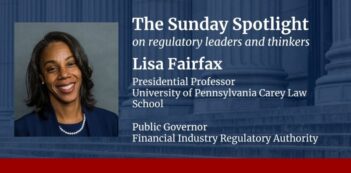
Experts explore the evolving sphere of ESG regulation in light of greater calls for corporate accountability.
The largest corporations in the world are responsible for nearly 70 percent of global greenhouse gas emissions. Corporate boards remain overwhelmingly white. As calls for racial and climate justice increase, activists and shareholders are placing greater scrutiny on businesses to address these environmental, social, and corporate governance (ESG) concerns.
Although ESG investment has reached record levels, some companies have attempted to cut corners. Companies have increasingly faced allegations of greenwashing, the phenomenon of corporations claiming to be environmentally friendly to entice consumers but failing to engage in sustainability efforts.
To hold corporations to higher standards, the U.S. Securities and Exchange Commission (SEC) proposed updated ESG reporting guidelines that would impose disclosure requirements for corporations that undertake ESG endeavors. Any claims made about environmental or equity-related gains would need to be substantiated by specific details about supposed impacts, and companies would explicitly describe their strategies to the SEC.
Because of the varied approaches to ESG ranging from environmental efforts to increasing diversity of corporate boards, stricter disclosure requirements could better inform both investors and the public about concrete efforts to fulfill ESG responsibilities. For example, under the proposal, companies would provide data about their direct and indirect greenhouse gas emissions throughout the entire value chain.
Amid an increasingly stark climate crisis and an uptick in anti-ESG legislation, the SEC’s proposal could pave the way for more efficient and transparent ESG initiatives, prompted by the accountability measures embedded in the proposed disclosure requirements.
In this week’s Saturday Seminar, scholars discuss the growing importance of ESG, as well as the changing regulatory landscape surrounding environmental and social issues within corporations.
- In an article published in The Yale Law Journal, Shelley Welton of the University of Pennsylvania Carey Law School identifies the risks of “net zero” as the organizing paradigm of climate change law. Arguing that policymakers too often take a libertarian approach to net zero and ignore its social dimensions, Welton suggests that lawmakers need to be creative in writing net-zero laws that both prescribe specific actions for administering agencies and build in flexibility to account for the rapidly evolving technological space. Welton also supports using early adopters of net-zero legal regimes as models to balance short- and long-term goals, including countries and states that have both employed broad targets with timetables and created expert advisory panels to guide decision-making.
- In a paper issued by the European Corporate Governance Institute, Elizabeth Pollman of the University of Pennsylvania Carey Law School examines the history and usages of the term ESG to shed light on the future of the ESG movement and regulatory reform. Pollman argues that combining E, S, and G into one acronym has both made the term flexible enough to garner support from a diverse group of stakeholders and created challenges for reliable, standardized firm ratings and metrics. Pollman outlines a variety of solutions to the ESG problem, including narrowing the meaning of ESG, creating a taxonomy of more precise terms related to ESG, and getting rid of the term altogether.
- With new legislation proposed in both the European Union and the United States, ESG reporting is “on the cusp of a regulation revolution,” contends Aideen O’Dochartaigh of Dublin City University Business School in an article in the California Management Review. The Corporate Sustainability Reporting Directive, an integral part of the European Union’s Green Deal program for a low-carbon economy, will require more than 50,000 businesses to report particular ESG indicators, while the EU Taxonomy will require companies to disclose their contributions to environmental objectives. In the United States, the SEC has similarly proposed a rule that would require approximately 6,600 companies to make climate-related disclosures in annual filings. O’Dochartaigh concludes that ESG reporting should become a business priority for companies and contends that regulators will continue emphasizing social issues in future legislation.
- Following investor demand for the SEC to standardize companies’ climate and ESG disclosures, the Biden Administration and the SEC have moved to reform-related regulations, explains Virginia Harper Ho of the City University of Hong Kong School of Law in an article published in the University of Illinois Law Review. Ho argues that the current reporting framework must be amended to implement better requirements in three core areas: corporate governance, risk factors, and human capital. Even though the SEC has the rulemaking authority to adopt such amendments, Ho suggests that these proposals would be implemented more quickly and at less cost if the agency secured congressional support.
- In an article published in the Texas Law Review, Cynthia A. Williams of Osgoode Hall Law School and Donna M. Nagy of the Indiana University Maurer School of Law argue that the SEC’s past history of restricting access to ESG information has impeded progress in the corporate world. According to Williams and Nagy, the SEC has failed to recognize the importance of ESG as fitting within its mission, despite congressional efforts to enhance corporate accountability, such as the Dodd-Frank Wall Street Reform and Consumer Protection Act. Williams and Nagy recommend that the SEC reframe its mission of “protecting investors” to encompass greater transparency for investors from corporations concerning their ESG initiatives.
- ESG ratings released by third parties can often muddle corporate realities, according to Alexander Coley in a forthcoming article to be published in the Northwestern Journal of International Law & Business. Coley argues that the SEC’s existing regulatory framework should incorporate such ratings to limit falsities such as greenwashing. If a company discloses its ESG ratings gained through a third party, these ratings should be subject to an anti-fraud and investor protection analysis conducted by the SEC. Coley contends, however, that the existing regulatory framework does not provide an avenue for attaching liability to false ESG ratings due to their third-party status. While dubious of the long-term effects, Coley notes that the SEC’s recent disclosure proposal has the possibility to minimize reliance on third-party ESG ratings by requiring corporations to provide certain metrics.



